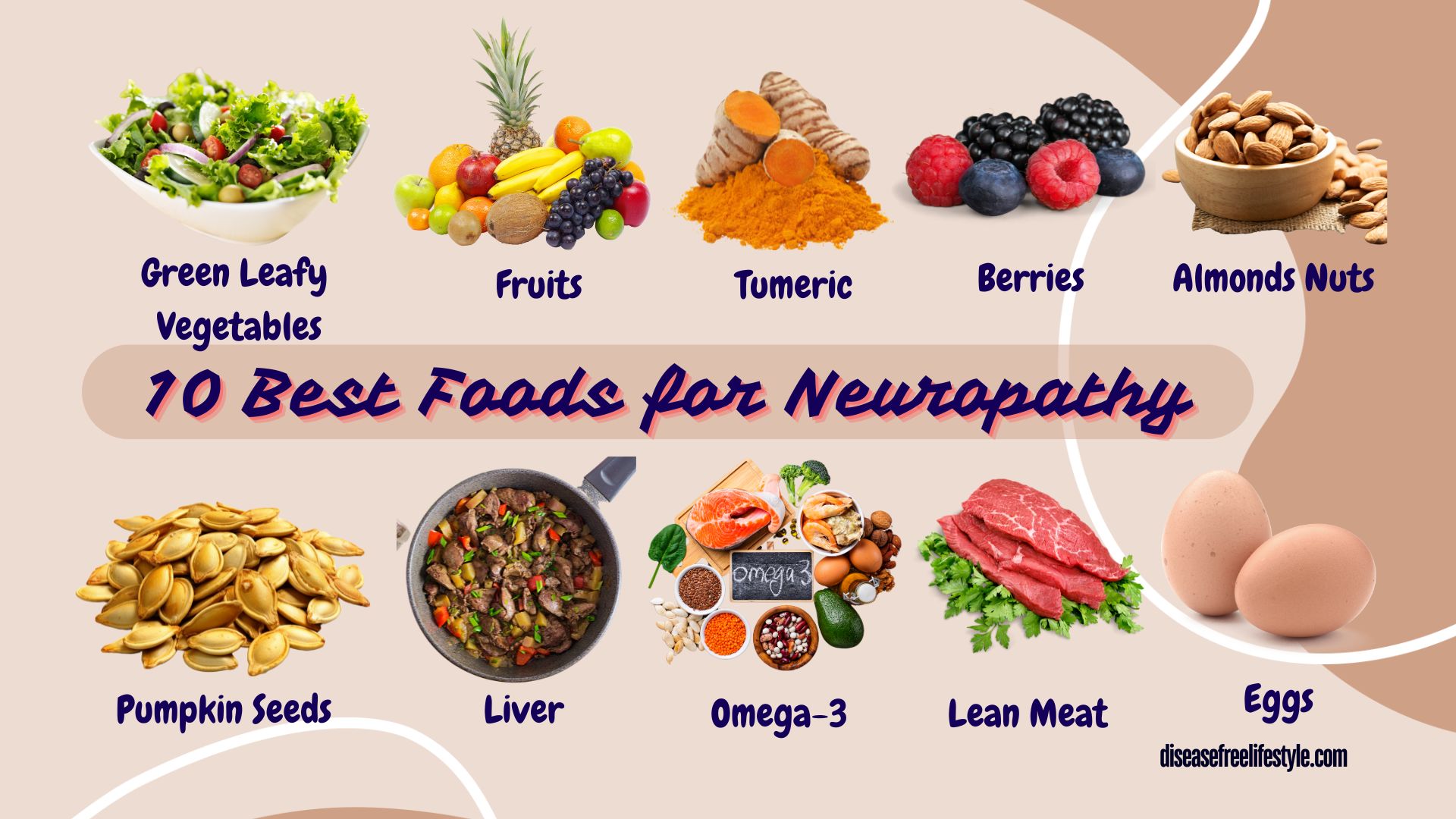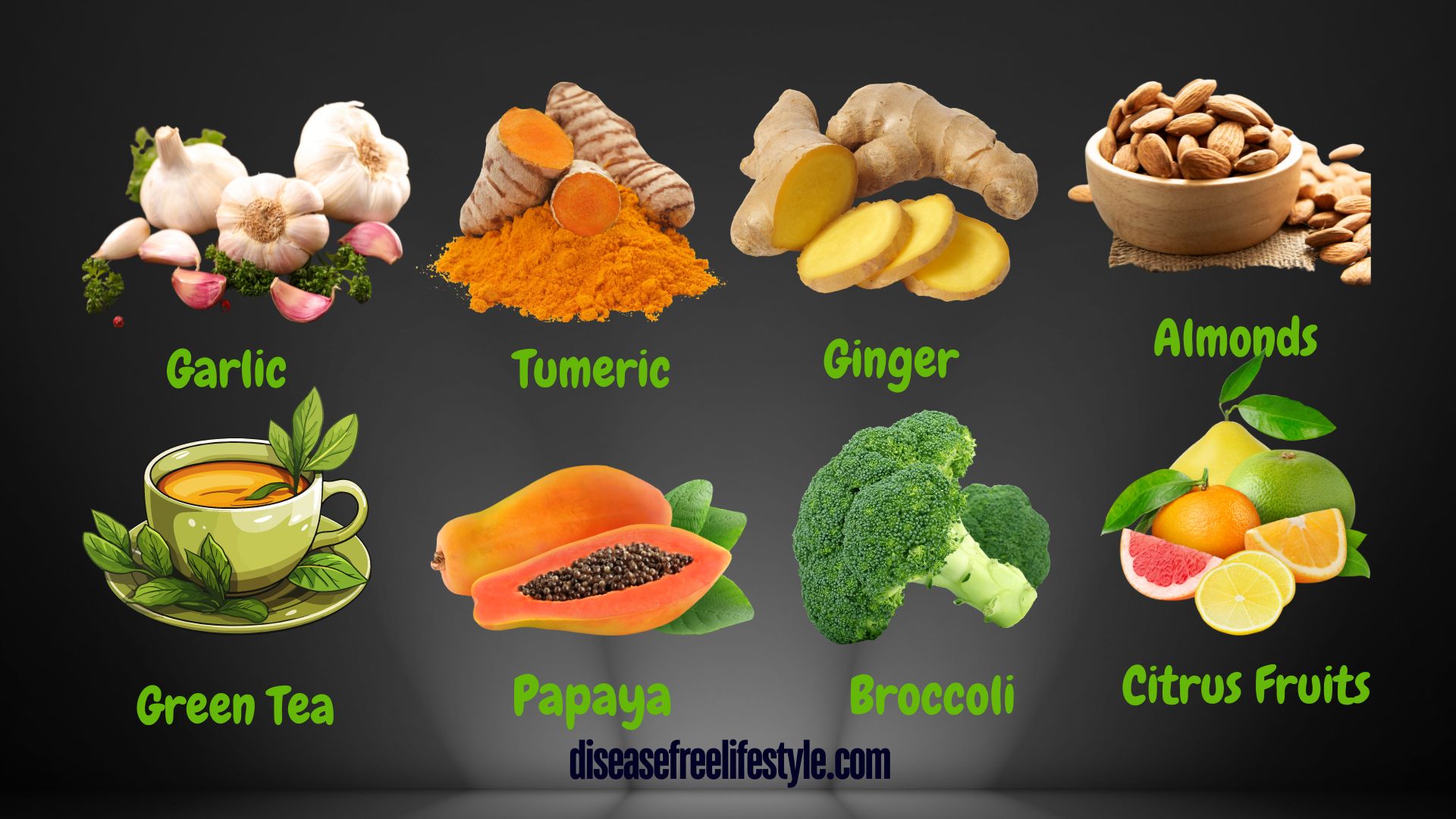10 Best Foods for Neuropathy: Natural Remedies to Boost Your Nervous System
Neuropathy is a condition characterized by nerve damage, often resulting in symptoms such as burning, tingling, numbness, and weakness in the hands and feet. It can arise due to various reasons, such as vitamin deficiencies, diabetes, injuries, and other medical conditions. A proper diet rich in essential nutrients can play a vital role in repairing nerve damage, boosting nerve function, and alleviating neuropathic pain. In this article, we will explore the 10 best foods for neuropathy that can help support your nervous system and reduce pain naturally.
1. Green Leafy Vegetables

Green leafy vegetables are powerhouses of nutrients, particularly beneficial for nerve health. Vegetables like spinach, broccoli, kale, and collard greens are rich in alpha-lipoic acid (ALA), an antioxidant that helps prevent nerve damage and promotes nerve regeneration. ALA can also assist in reducing blood sugar levels, which is especially beneficial for people with diabetic neuropathy. These vegetables also provide B vitamins, which are crucial for nerve regeneration and function. Include 1-2 servings of green leafy vegetables in your diet daily to boost your nervous system health.
2. Berries

Berries, including blueberries, strawberries, and raspberries, are rich in antioxidants and flavonoids that protect nerve cells from damage caused by oxidative stress. The anti-inflammatory properties of berries can also help reduce nerve inflammation and support overall nerve function. Berries are easy to add to your diet, either as a snack, in smoothies, or as a topping for cereals and yogurts. Including berries in your diet helps fight free radicals and protects the nervous system.
3. Fruits for Nerve Health

Certain fruits are especially beneficial for nerve health due to their rich content of vitamins and antioxidants. Apples, bananas, and oranges are excellent choices for supporting the nervous system. Apples contain B-complex vitamins (B1, B2, and B6), which help maintain nerve function. Bananas are rich in vitamin B6, potassium, fiber, and antioxidants, all of which are beneficial for nerve health. Oranges are packed with vitamin C, which helps boost the immune system and aids in nerve repair. Incorporate a variety of fruits into your daily diet to provide the essential nutrients your nerves need.
4. Foods Rich in Omega-3 Fatty Acids

Omega-3 fatty acids are essential for maintaining the health of the myelin sheath, which is the protective covering around nerves. Omega-3s have anti-inflammatory properties and help improve nerve transmission, which is crucial for individuals experiencing neuropathy. Fatty fish like salmon, mackerel, and sardines are excellent sources of omega-3s. Plant-based options include flaxseeds, chia seeds, and walnuts. Aim to include fatty fish in your diet twice a week or consume plant-based omega-3 sources daily for optimal nerve health.
5. Eggs

Eggs are a great source of vitamin B12, which is essential for nerve repair and regeneration. Vitamin B12 deficiency can cause nerve damage and lead to symptoms such as numbness, tingling, and weakness. Including eggs in your diet helps maintain the integrity of the myelin sheath and promotes overall nerve health. A single boiled egg can provide a significant portion of your daily B12 requirement. Consuming eggs regularly can be particularly helpful in repairing and rejuvenating damaged nerves.
6. Lean Meat

Lean meats such as chicken and turkey are excellent sources of protein, vitamin B12, and iron—all of which are crucial for nerve health. These nutrients play an important role in the production of myelin, which protects nerve fibers. For those with neuropathy, ensuring a sufficient intake of B12 is essential, as deficiencies can lead to further nerve damage. While lean meats are beneficial, red meat such as beef should be consumed in moderation.
7. Liver

The liver from animals such as cows, goats, and chickens is a rich source of vitamin B1 (thiamine) and folate. Vitamin B1 is essential for nerve function and helps prevent further nerve damage. Folate also plays a key role in nerve health, contributing to the maintenance of a healthy nervous system. Including liver in your diet once or twice a week can significantly boost nerve function and overall health.
8. Nuts

Nuts such as almonds, walnuts, peanuts, and hazelnuts are excellent sources of vitamins, minerals, and omega-3 fatty acids, which are crucial for nerve health. Vitamin B, which is found in abundance in nuts, is essential for maintaining the health of the nervous system. Omega-3 fatty acids present in nuts help protect nerve fibers and provide energy to the nervous system. Eating a handful of nuts daily can provide the nutrients necessary for nerve repair and overall brain function.
9. Pumpkin Seeds

Pumpkin seeds are loaded with magnesium, an essential mineral for maintaining healthy nerve function. Magnesium helps regulate blood sugar levels, which is particularly important for individuals with diabetic neuropathy. Additionally, pumpkin seeds contain zinc, which is necessary for proper nerve signaling. Including a handful of pumpkin seeds in your daily diet can help manage symptoms such as burning, tingling, and numbness, providing much-needed relief from neuropathy symptoms.
10. Turmeric

Turmeric is a spice known for its powerful anti-inflammatory properties, thanks to its active compound, curcumin. Inflammation is a significant contributor to nerve damage, and turmeric can help reduce this inflammation, promoting nerve healing and regeneration. It also acts as an antioxidant, protecting nerve cells from damage caused by free radicals. You can add turmeric to your meals or consume it as a supplement after consulting with your healthcare provider. Consuming turmeric daily can help reduce neuropathic pain and improve overall nerve function.
Conclusion
Managing neuropathy and boosting the nervous system can be significantly influenced by the food choices you make. Including nutrient-rich foods like green leafy vegetables, berries, fruits, omega-3-rich foods, eggs, lean meat, liver, nuts, pumpkin seeds, and turmeric can provide the necessary vitamins, minerals, and antioxidants that are essential for nerve repair and function. Vitamins B1, B6, B12, magnesium, omega-3 fatty acids, and antioxidants are all vital in reducing inflammation, repairing nerve damage, and alleviating symptoms of neuropathy.
To combat neuropathy effectively, aim to create a balanced diet that includes these top 10 foods. By supporting your nervous system with the proper nutrients, you can improve your overall quality of life and reduce the symptoms associated with nerve damage. Remember, a healthy diet, along with proper medical guidance, can go a long way in keeping neuropathy symptoms at bay and maintaining a healthy nervous system.
Disclaimer:
It’s important to note that individual dietary needs can vary based on factors like age, gender, activity level, and specific health conditions. Consulting with a healthcare professional or a registered dietitian can provide personalized advice tailored to individual needs and goals.









